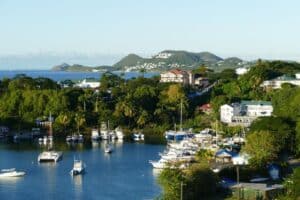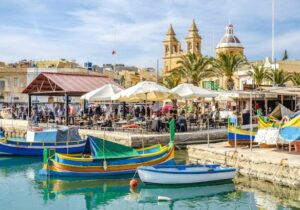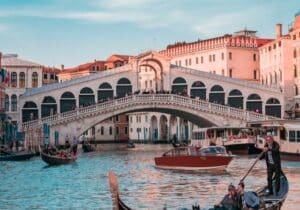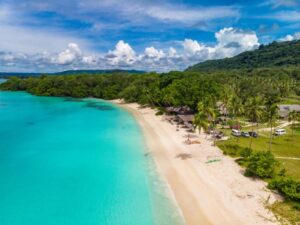A second passport is when you obtain citizenship and an accompanying passport from a country other than your home or native country.
This passport (or travel document) serves as proof of citizenship and can be acquired through citizenship by descent, naturalization, marriage or investment.
It offers a variety of benefits, including rights related to dual citizenship, visa-free travel to several countries, increased personal and financial security, as well as potential tax advantages. Having a second passport allows you the freedom to live, work, or retire in the country it was issued in.
Our comprehensive guide will take you through everything you need to know about how to get a second passport, including:
What Is a Second Passport?
A second passport is a travel document issued by a country other than your home country, allowing you to hold dual citizenship. It permits you to travel to and reside in a country other than your country of origin.
With a second passport, you have the same rights and privileges as a citizen. These rights can include working and living in the country, owning property, voting, paying taxes and depending on the country, potentially military service.
Benefits of Owning a Second Passport
According to Global Intelligence Unit’s report on “The Transformation of Citizenship“, the main advantage of obtaining a second passport is the enhancement of an individual’s global mobility. This is especially pertinent for people who come from countries in Africa, Asia and Latin America where there are limited visa-free travel options.
Let’s take a look at all the benefits of getting a foreign passport:
 Travel freedom
Travel freedom
Second passports gives you visa-free or visa-on-arrival travel to numerous countries as well as to move or work freely across borders, significantly expanding your global travel options.
 Global mobility opportunities
Global mobility opportunities
A second passport from a high-ranking country on the Global Passport Index provides access to a wider range of investments and easier business travel.
 Stability
Stability
A second passport provides stability for you and your family in times of uncertainty. It ensures greater personal and economic freedoms, reduced risks, and the opportunity to build a future in the best country.
 Retirement planning
Retirement planning
A second passport is a great option for retirement planning, especially for those moving abroad. While not required, it simplifies living in a foreign country and makes visiting family easier.
 Tax and financial benefits
Tax and financial benefits
A second passport can offer access to countries with favorable tax policies, such as lower income tax rates or business tax incentives. This can reduce your overall tax burden and improve financial planning, particularly for retirees or business owners looking for more favorable tax environments.
 Social services
Social services
If you hold a foreign passport in a country with high-quality healthcare, education and other social benefits, you now have access to these as a part of your citizen privileges.
6 Ways to Get a Second Passport for Another Country
1. Citizenship by Birth
Birthright citizenship (also known as jus soli or right of soil) grants automatic citizenship to those born within the borders of certain countries (such as Canada and Ireland). The country a person is born in will determine whether the individual receives restricted or unrestricted citizenship.
2. Citizenship by Descent
Citizenship by descent allows you to obtain citizenship based on your ancestry, depending on the country’s laws. You may qualify if you have parents, grandparents, or even great-grandparents from certain countries. Many European countries, including Ireland, Italy, and Poland, offer this route.
3. Citizenship by Investment (CBI)
Citizenship by investment (CBI) allows individuals to obtain citizenship by making a significant financial investment, such as in real estate, business, or government funds. Popular CBI programs include those in Malta, St. Kitts and Nevis, and Antigua and Barbuda.
4. Citizenship by Naturalization
Citizenship by naturalization is obtained after living in a foreign country for a certain period. The requirements usually include a minimum residency period, language skills, and integration. For example, Portugal’s Golden Visa grants citizenship after five years.
5. Citizenship by Marriage
Marrying a citizen of another country can make you eligible for citizenship by marriage after a certain period, depending on the country’s laws. In most cases, you must provide a marriage certificate as proof of your marriage. France and Spain offer this route with shortened residency requirements.
6. Citizenship by Exception
Citizenship by exception, is a special pathway that lets some foreigners become citizens without first living in the country. This route is usually for people who make big contributions, like investing, creating jobs, or achieving in sports, culture, or science. Countries such as Serbia and the UAE offer it to people who bring special value or recognition to the country.
17 Best Countries to Get a Second Passport In 2025
1. St. Kitts and Nevis

The investment options are:
- Donation: Make a $250,000 contribution to the Sustainable Growth Fund (SGF).
- Real estate: Invest a minimum of $400,000 in government-approved real estate.
A St. Kitts and Nevis passport grants visa-free access to over 150 countries.
The citizenship application process takes four to six months, and once the passport application is submitted, the processing time should be two to three weeks.
2. Antigua and Barbuda

Investment options include:
- Donation: $230,000 to the National Development Fund.
- Real estate: $300,000 investment in pre-approved property
The process takes six months, with the second valid passport issued in as little as three weeks.
3. Dominica

Applicants can choose between:
- Donation: $200,000 to the Economic Diversification Fund for a single applicant or $250,000 for a family of four.
- Real estate: $200,000 investment in pre-approved property
Processing time is about six to nine months, and a new second passport is issued in three weeks.
The passport offers visa-free access to over 140 countries, appealing to global travelers who want enhanced mobility.
4. Grenada

Applicants can qualify by:
- Donation: $235,000 to the National Transformation Fund.
- Investment: $270,000 in government-approved shares.
- Real estate: $350,000 investment in government-approved property.
This program has one of the lowest investment costs and takes about nine months to process.
5. St. Lucia

Applicants can gain citizenship by:
- Donation: $240,000 to the National Economic Fund.
- Real estate: $300,000 investment in government-approved property.
The program is efficient with a mere 10 to 12-month processing time.
Once citizenship is granted, the passport application takes 8 to 10 weeks to process.
6. Turkey

- Real estate: $400,000 in approved property.
- Government bonds: $500,000 in bonds or capital transfer.
- Deposit: $500,000 in a Turkish bank.
The citizenship process is quick, granted in just four months. After that, the passport application can be completed in just one to two weeks.
7. Malta

This program provides access to live and work in the Schengen Area.
The minimum investment required is:
- Investment: €750,000 non-refundable contribution to the National Development and Social Fund (NDSF) with a 12-month residency requirement (expedited option) or €600,000 non-refundable contribution to the NDSF and evidence of 36 months of residency (standard option).
- Real estate: €700,000 minimum investment in residential property (held for 5 years) or entering into a rental agreement for at least €16,000 per year, also held for 5 years.
For frequent travelers, Maltese citizenship offers visa-free access to most countries worldwide.
Alternatively, you can opt for the Malta Residency by Investment Program (MPRP), which offers a lower-cost alternative to citizenship, allowing applicants to lease a property for €12,000 annually or purchase one for €350,000.
8. Portugal

After meeting the required residency criteria of legally living in the country for five years, the program allows applicants to apply for second citizenship and a new passport through 3 investment options:
- Donation (Option 1): €250,000 minimum donation toward a cultural project, artistic institution or heritage preservation.
- Donation (Option 2): €500,000 minimum donation toward scientific or technological research.
- Investment (Option 1): €500,000 in existing Portuguese businesses that create at least 5 permanent jobs for a minimum of three years.
- Investment (Option 2): €500,000 in existing Portuguese businesses that creates 10 full-time jobs or 8 if the business is located in a low-density area (focus is on job creation more than the investment amount)
- Investment Funds: €500,000 minimum investment in either a venture capital or private equity investment funds as registered under Portuguese legislation.
The Portugal D7 Visa also offers an alternative for those who don’t want to make a large investment. It’s ideal for retirees as it provides long-term residency without a significant financial commitment.
9. Spain

Investment options include:
- Real estate: €500,000 investment in property.
- Business investment: €1 million investment in Spanish companies.
- Government bonds: €2 million investment in Spanish government bonds.
- Deposit: €500,000 transfer to a Spanish bank account.
The Spain Non-Lucrative Visa also provides an alternative for those not wanting to make a large investment. It is ideal for retirees as it requires a minimum monthly income of approximately €2,361.08.
10. Greece

Citizenship can be granted after maintaining residency for seven years, allowing applicants and their families to live and work anywhere within the European Union (EU).
Investment options include:
- Real estate: €250,000 in property.
- Government bonds: €400,000 in government shares or other approved financial instruments.
This investment program provides a second passport. Once the requirement of residing in Greece for at least 183 days per year for seven years is met, applicants can submit their passport application to obtain Greek citizenship.
11. United States

This program initially provides a Green Card, with the opportunity to apply for U.S. citizenship after five years of maintaining the investment as well as permanent residency.
Investment options include:
- Direct investment 1: in a U.S.-based enterprise in a Targeted Employment Area (TEA) equal to or greater than $800,000.
- Direct investment 2: in a U.S.-based enterprise in a non-TEA area equal to or greater than $1,050,000.
When investing, one must create or save ten permanent full-time jobs for qualified US workers and hold a clean criminal record.
This investment program offers an alternative passport. Once the residency requirements are met, applicants can submit their passport application and become full U.S. citizens.
12. Canada

The quickest path to Canadian citizenship is through the Express Entry system, which selects skilled workers based on work experience, education, and language skills.
You can apply for citizenship after holding permanent residency for three years within a five-year period.
Family members of Canadian citizens or permanent residents can be sponsored for residency, and citizenship eligibility is after three years.
Another option is the Canada Start-Up Visa program, which offers permanent residency to entrepreneurs who start a business and secure investment from a designated Canadian incubator.
13. Hungary

- Real estate 1: Invest €250,000 in a state-approved real estate investment fund.
- Real estate 2: Invest €500,000 to purchase residential real estate.
- Donation: €1 million (non-refundable) contribution to a higher education institution.
Citizenship is possible after eight years of residency, offering the benefits of a second passport and enhanced global mobility.
14. Latvia

Investment routes include:
- Real estate: €250,000 in property.
- Investment: €50,000 in a capital company with fewer than 50 employees and an annual budget under €10 million.
- Bank deposit: Deposit €280,000 in a Latvian bank for at least five years.
- Government bonds: Minimum of €250,000 bond purchase.
Citizenship in Latvia is available after 10 years of continuous residency.
15. Italy

The investment options inlcude:
- Investment: €250,000 in a startup business
- Bonds or shares: €500,000 in corporate bonds or shared investments
The Italy Digital Nomad Visa is a great option for remote workers, allowing non-EU citizens to live and work in Italy while employed by a foreign company.
Additionally, those with Italian ancestry can apply for citizenship by descent and a second passport without needing to reside in Italy.
16. Serbia

However, applicants can only purchase certain types of real estate including:
- Apartments
- Residential buildings
- Business premises and business buildings, if they perform business activities.
These investment programs offer a chance to secure residency in Serbia, with citizenship eligibility possible after five years.
17. Vanuatu
The Vanuatu Citizenship by Investment Program offers non-citizens a way to obtain a second passport in a foreign country through a low investment of $130,000 with fast processing times.
The required investment is:
- Donation: $130,000 to the Vanuatu Development Support Program (DSP) (non-refundable).
This investment program offers a unique opportunity to gain second citizenship, allowing access to visa-free travel to over 90 countries and valuable global mobility benefits.
How to Apply for a Foreign Passport
Step 1: Determine eligibility
Confirm your eligibility for a second passport by investigating the laws of both the country you currently hold citizenship in as well as the country you’re planning to apply to. Focus on the routes available as well as dual citizenship laws.
Step 2: Gather the required documents
Collect necessary documents, which typically include:
- Proof of citizenship (e.g., birth certificate or naturalization certificate).
- Valid identification (e.g., driver’s license or government-issued ID).
- Passport photos that meet specific size and quality requirements.
- Any additional documents, such as a marriage certificate if your name has changed.
Step 3: Complete the application form
Fill out the passport application form. Most countries offer online applications, but paper forms are also available. Ensure all information is accurate and complete.
Step 4: Pay the application fee
Check the fee structure for the passport application fee and make the payment, which can usually be done online, by check, or in person, depending on the country’s regulations.
Step 5: Submit your application
Submit your application and documents. This can often be done online, by mail, or in person at a designated passport office or agency. If applying in person, make an appointment if required.
Step 6: Track your application
After submission, keep track of your application status through the passport agency’s website or customer service channels.
Step 7: Receive your passport
Once processed, you will receive your passport by mail or may need to pick it up in person. Check the delivery method provided during your application.
Step 8: Verify your passport
Upon receiving your passport, verify that all information is correct. Report any discrepancies immediately to the issuing authority.
How Can Global Citizen Solutions Help You?
Global Citizen Solutions is a boutique migration consultancy firm with years of experience delivering bespoke residence and citizenship by investment solutions for international families. With offices worldwide and an experienced, hands-on team, we have helped hundreds of clients worldwide acquire citizenship, residence visas, or homes while diversifying their portfolios with robust investments.
We guide you from start to finish, taking you beyond your citizenship or residency by investment application.

Frequently Asked Questions About How to Get a Second Passport
What is the cheapest second passport?
Dominica, St. Lucia, and Antigua and Barbuda offer the cheapest second passports, with a minimum investment of $200,000 to qualify for their citizenship by investment programs.
What is the easiest way to get a second passport?
A Citizenship by Investment (CBI) program is the easiest way to obtain a second passport for another country.
Through this program, you exchange a significant amount of money in exchange for citizenship and a second passport.
Which country gives the fastest passport?
Vanuatu, a South Pacific Ocean nation, offers the fastest route to a foreign passport. This can be done through their Citizenship by Investment program and the processing time ranges between 6 to 8 weeks.
Can US citizens get a second passport?
Yes, U.S. citizens can obtain a second passport in a foreign country as the United States acknowledges dual citizenship.
Can you have three different passports?
Yes, as long as your country of origin allows for dual or multiple citizenship then you can hold as many as three different passports or citizenships.
Are there any tax implications with having a second passport?
Yes, having a second passport can have tax implications, particularly related to citizenship-based taxation. Some countries tax citizens on foreign income while others do not.
It’s best to look at country-specific dual citizenship tax laws before acquiring a second passport to avoid potential double taxation.
Are there any risks or disadvantages associated with having a second passport?
Some risks of getting a second passport include potential loss of original citizenship, double taxation depending on the host country and complications related to consular protection.
How to get a second passport for another country as a U.S. citizen?
As a U.S. citizen wanting a second passport, you need to first become a citizen of the intended country and then submit an application for that country’s passport.
How do I obtain a second passport through ancestry?
You need to establish direct lineage to a citizen of the country you want to get a second passport for.
This often requires birth and marriage certificates and potentially passports or other proof of citizenship from family members.
Can I get a second passport through marriage?
Yes, many countries offer pathways to a second passport and citizenship through marrying a citizen of the intended country.
Keep in mind that requirements and processes will vary from country to country.
How much does it cost to get a second passport?
The costs of getting a second passport can vary significantly depending on both the country and the method of acquiring citizenship.
Investment-based second passports are much more expensive than those acquired through ancestry or marriage.
There are administrative and legal costs involved and in cases of citizenship by investment programs, there are substantial financial investments.
Can I get a second passport if my country doesn’t allow dual citizenship?
Yes, it is possible but you will likely have to renounce your original citizenship or face legal complications depending on the laws of both countries.
How long is a second passport valid for?
In many countries, including the United States, passports are typically valid for 10 years for adults and children 5 years for children under the age of 16.
However, the validity period can vary depending on the issuing country.

 Artur Saraiva
Artur Saraiva 

